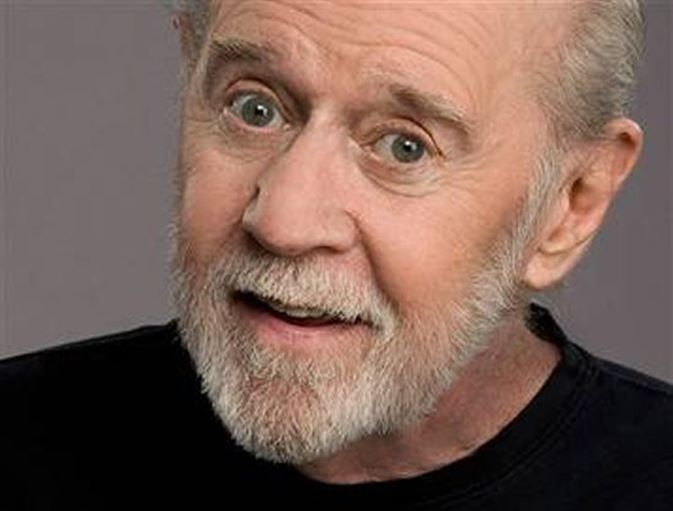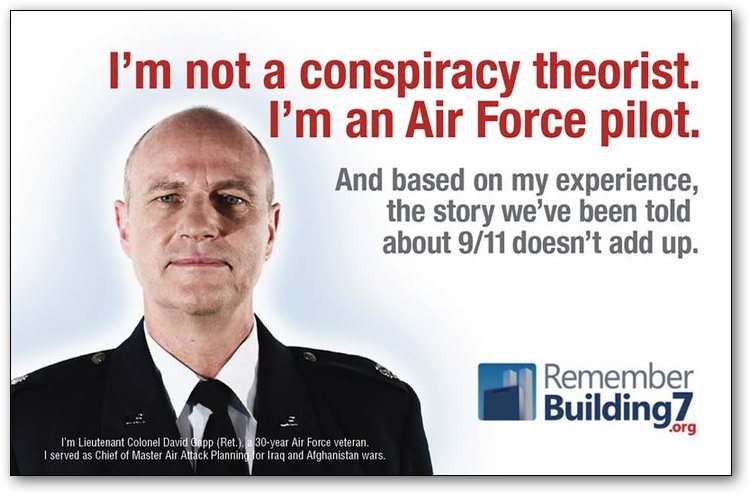
By Craig McKee
The message is loud and clear. Go after justice for 9/11 in the courts, and not only will you lose, you’ll be punished.
That’s what April Gallop and her lawyer, William Veale, found out as their lawsuit against former vice-president Dick Cheney, former secretary of defense Donald Rumsfeld, and former Joint Chiefs of Staff chairman Richard Myers concluded with a final slap in the face. This came in the form of a $15,000 fine levied against Veale for filing a “frivolous” appeal (the appeal had already been turned down in April of last year).
The decision was handed down by a three-judge panel headed by Justice John M. Walker, who just happens to be George W. Bush’s cousin – proving that the American justice system has a twisted sense of humour at times. Continue reading
Category Archives: propaganda
Make planning a false flag attack a high felony: lawyer and 9/11 activist

In order to bring a nation to support the burdens of maintaining great military establishments, it is necessary to create an emotional state akin to war psychology. There must be the portrayal of external menace.–John Foster Dulles secretary of state in the Eisenhower administration.
By Craig McKee
False flag operations are already illegal – aren’t they?
After all, you can’t legally kill people or destroy property, and then falsely implicate someone else in the crime. But Florida lawyer David Petrano, a member of Lawyers for 9/11 Truth, thinks that a false flag operation is a different and more destructive animal altogether. This is why he’s proposing that Congress pass a False Flag Terrorism Prohibition Act.
“People want a line in the sand now,” Petrano said in a phone interview this week.
Petrano, whose work on the wording is in its early stages, acknowledges that it is highly unlikely Continue reading
When did they know? 35 truthers on how they awakened to the 9/11 lie

January 11, 2012
By Craig McKee
Myth: Most “conspiracy theorists” thought 9/11 was an inside job from day one, because these types of people always imagine elaborate conspiracies even though the evidence rarely backs them up. Most are paranoid and obsessive.
Reality: Many if not most of the members of the 9/11 Truth movement took months or years to begin doubting what we have been told. Those who have become leaders of the movement tend to be intelligent and well educated, and they were open-minded enough to consider evidence that we hadn’t been told the truth by the government or the media.
I decided to pose a question to some of the most notable members of the movement to find out exactly when they twigged that 9/11 was an inside job and not a terrorist attack perpetrated by fundamentalist Muslims. Here’s the question I sent them:
“When did you come to believe that the 9/11 official story was false and that 9/11 was an inside job – and what piece or pieces of information convinced you?”
For the purpose of this article, I’m defining “truth leaders” as being people who have been active in the movement in some visible way – spreading the word either by organizing activities or by researching and writing about or making films about 9/11 to raise awareness. It does not connote an endorsement of their various positions on 9/11.
I was fortunate to receive responses from the majority of the best known truth activists I wrote to. These included David Ray Griffin, Barrie Zwicker, Barbara Honegger, Mike Gravel, Rob Balsamo, Cynthia McKinney, and 30 others listed below. All responses are original and were sent to me by the respondents with the exception of Balsamo’s, which he offered from a previously posted statement.
As you will read, the respondents’ backgrounds run the gamut. There are academics, authors, pilots, engineers, chemists, architects, journalists, politicians, musicians, filmmakers, lawyers, soldiers, and citizen researchers and activists of all kinds. There is a former U.S. senator, a former congresswoman, a high-level NASA executive, a policy analyst in the Reagan White House, and a Nobel Peace Prize nominee.
It’s an impressive group to say the least. In assembling it, I deliberately did not restrict myself to people I most agree with – or who most agree with each other. I sent the question to as many members of the Truth movement as I could. I’m not interested in entertaining criticism that one person or another should have been excluded. I think it’s much more interesting to read responses from people with disparate views. The length of the answers varies greatly, and cuts were kept to a minimum.
Here are the participants in this order:
David Ray Griffin, Barrie Zwicker, Cynthia McKinney, William Veale, Barbara Honegger, Mike Gravel, Craig Ranke, Rob Balsamo, Cindy Sheehan, Niels Harrit, Shelton Lankford, James Fetzer, James Hufferd, Adam Syed, George Ripley, Adam Ruff, Sheila Casey, Bruce Sinclair, Elizabeth Woodworth, Josh Blakeney, Aldo Marquis, Frances Shure, Maxwell C. Bridges, Anna Yeisley, Mark Gaffney, Giulietto Chiesa, Paul Zarembka, Ken Freeland, Jonathan Mark, Dwain Deets, Massimo Mazzucco, Nelisse Muga, Matthew Witt, Simon Shack, Graeme MacQueen.
And here’s what they said:
David Ray Griffin (Retired theology professor; past nominee for the Nobel Peace Prize for his 9/11 work; founder, Consensus 9/11 Panel; author of 10 books on 9/11)
In the fall of 2002, one of my students at the Claremont School of Theology told me that a visiting professor said that 9/11 was an inside job and asked if I wanted to meet him. I said yes, and after talking with him, I told Continue reading
The 9 biggest 9/11 stories of 2011: old fights and new directions

By Craig McKee
Paul Simon stepped to the microphone at Ground Zero and something amazing happened.
The legendary singer/songwriter had been asked to sing the non-threatening Bridge Over Troubled Waters at the ceremony for 9/11’s 10th anniversary ceremonies in New York, but he didn’t. Instead, he launched into a haunting version of another classic that begins, “Hello darkness, my old friend.” Simon had decided that the most appropriate statement for this occasion would come from Continue reading
Standing up for unpopular truths about 9/11 comes at a cost

By Craig McKee
Is standing up for what you believe worth losing friends over?
Sometimes those friends don’t give you a choice. Other times, you can decide to stay away from certain subjects with certain people.
Recently I parted ways with two people I’ve known for more than a quarter of a century. Admittedly, we haven’t hung out for some time, but we do have a history. I don’t think we’re going to be adding to it, though.
In fact, there are five people I connected with on Facebook who are no longer among my online friends. The short version of the story is that they don’t much like my opinion that 9/11 was an inside job and a Continue reading
Power and the illusion of freedom: simple truth from George Carlin

The limits of debate are established in this country before the debate even begins. Everybody else is marginalized, made to seem like Communists or some other disloyal person. Kook, there’s a word! Now it’s conspiracy. They’ve made that something that can’t even be entertained for a minute – that powerful people might get together and have a plan? Doesn’t happen! You’re a kook, you’re a conspiracy buff! – George Carlin
By Craig McKee
George Carlin made it so clear and so simple. That was his genius.
With humour that we could all relate to, he told us the truth about how our world works and how most of us are cattle for the super rich. How we are conned into believing in the very people who enslave us, how we are conned into believing in the illusion of freedom.
He knew and he told us. We laughed, but did we really listen?
Carlin passed away in 2008. At the time I thought it was sad – just like it’s sad when any beloved entertainer dies. But looking back on it, we lost something unique and irreplaceable when Carlin left us. Continue reading
Journalists would be thrilled to break 9/11 'inside job' story, if there was one: Kay
By Craig McKee
Jonathan Kay lives in a truly wonderful world.
In this world, journalists are just dying to break any story that would show that 9/11 is an inside job. And any who did would surely be rewarded with wealth, fame, and maybe a Pulitzer Prize.
Too bad for them there isn’t a shred of evidence for this ridiculous “conspiracy theory.” If there were, we’d have hundreds of ambitious scribes fighting and scratching to find out who could get that April Gallop interview first. Somebody heard bombs going off in the towers before the planes hit? 60 Minutes would have been there. A big plane got sucked into an impossibly tiny Continue reading
Teach kids conspiracy theories are ‘bad for society’: an interview with Jonathan Kay
 By Craig McKee
By Craig McKee
It’s a challenge to interview someone you’d rather be debating. That was the case when I interviewed Canadian writer and journalist Jonathan Kay this week. Kay, an editor with the National Post, is the author of Among the Truthers, which attempts to examine and explain the world of conspiracy theorists. Why do these otherwise intelligent people believe the “bullshit” that they do, he wonders? He sees the 9/11 Truth movement as being ridiculous and based on arguments that “even an eight-year-old” would see through. I chose to try and cover as much ground in 45 minutes as I could rather than getting into an in-depth debate on any one point. I did find things in his arguments that cry out for further argument , and I will offer my analysis of his remarks in a subsequent post. I encourage readers to offer their own comments at the end of this article.
CM: What is the difference between a conspiracy theorist and someone who does legitimate research to unearth a real conspiracy?
JK: I define according to the method of argumentation of the people who advance the theory in question. I give the example of Iran/Contra, Teapot Dome, the Sponsorship Scandal or Watergate, which of course were real historical conspiracies. If you’re advancing something like this, one person will advance evidence and the other person will refute it, and by that method you Continue reading
Griffin challenged for ‘weak logic’, ignoring evidence on 9/11 'calls'
By Craig McKee
David Ray Griffin’s newest book is receiving criticism not so much from believers in the government’s official story as from his usual supporters within the 9/11 Truth movement.
In a new essay, Paul Zarembka – an economics professor, 9/11 researcher, and editor of The Hidden History of 9-11 – offers a critique of Griffin’s analysis of the subject of whether phone calls from the four allegedly hijacked airliners on Sept. 11, 2001 were faked. Zarembka challenges the conclusions reached in chapter five of Griffin’s new book, 9/11 Ten Years Later: When State Crimes Against Democracy Succeed.
“The internal logic of Griffin’s chapter rather surprised me for its weakness,” Zarembka writes in the Continue reading
CIT would likely have said no to ‘fixed’ Toronto 9/11 hearings: Ranke
By Craig McKee
Citizen Investigation Team would almost certainly not have participated in the Toronto 9/11 hearings last month even if invited, CIT’s Craig Ranke said in an interview.
“We knew they weren’t going to give us a fair hearing, even in the unlikely event that some of our evidence was addressed,” Ranke says.
“If we had been invited, it would have been foolish for us to automatically accept knowing that we’d be walking into a rigged situation where all aspects of the discussion, and even the final report, were controlled by our detractors and their associates.”
Ranke says it’s apparent to him that one of the major goals of the hearings all along was to marginalize CIT’s evidence that a large plane approached, but did not hit, the Pentagon Continue reading


